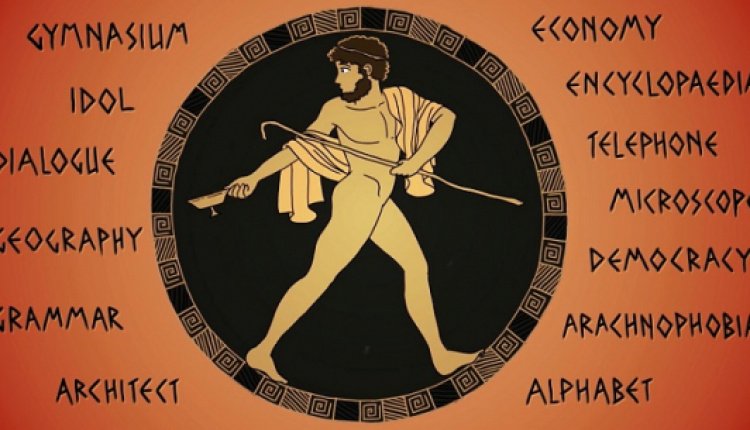The Greek Language: A Collection Οf Oddities & Fascinating Features
- by XpatAthens
- Thursday, 10 October 2024

1. The Longest Word in Greek (and in the World)
Greek is famous for its love of compound words, where different words are combined to create a single term. In fact, it holds the record for the longest word ever written. This mouthful comes from Aristophanes' comedy Ecclesiazusae and has a staggering 171 letters:
Lopadotemachoselachogaleokranioleipsanodrimypotrimmatosilphioparaomelitokatakechymenokichlepikossyphophatto
peristeralektryonoptekephalliokigklopeleiolagōiosiraiobaphētraganopterýgōn.
This word is a description of a fictional dish that combines a myriad of ingredients, showcasing the Greeks’ love for detailed, descriptive compounds. It’s a bit of a joke in itself, poking fun at overly complex names.
2. Words That Exist Only in Greek
Greek is rich in words that are so tied to its culture and worldview that they don’t have a direct translation in other languages. Here are a couple of examples:
- Meraki (μεράκι): This beautiful word describes doing something with soul, creativity, or love—putting "a piece of yourself" into what you're doing. Whether it's cooking a meal or writing a letter, meraki means going the extra mile to make it special.
- Philoxenia (φιλοξενία): Literally meaning "love of strangers," this term refers to the deeply rooted Greek tradition of hospitality. It’s more than just being polite—philoxenia is about making guests feel like family.
- Eudaimonia (ευδαιμονία): Often translated as "happiness," it’s more accurately defined as a state of being good-spirited or flourishing—essentially, the pursuit of a fulfilling, meaningful life, which was central to ancient Greek philosophy.
3. The Dual Number: When Two is Special
While most languages today use singular and plural forms, ancient Greek also had a dual number. This unique grammatical form was used when referring to exactly two people or things. So, instead of saying “we” (plural) when talking about two people, ancient Greeks would use a specific form for "the two of us."
The dual number was used in verb conjugation, pronouns, and even nouns. For example, the word "ὀφθαλμός" meaning eye was the singular form, "ὀφθαλμοί" the plural, and "τὼ ὀφθαλμὼ" was used to refer to the pair of eyes. The dual number slowly disappeared from the language by the Classical period, but it’s a fascinating reminder of the precision in ancient Greek grammar.
4. Koine Greek: The First Global Language
Koine Greek could be considered the first global language in human history. Emerging after the conquests of Alexander the Great, it spread across a vast territory from Greece to Egypt, Persia, and even India. People from vastly different regions and cultures used it as a lingua franca, facilitating trade, diplomacy, and intellectual exchange.
Koine Greek was also the language of early Christianity, as the New Testament was written in it, and it played a crucial role in the spread of religious ideas. Its wide-reaching influence made Greek one of the earliest languages to bridge disparate cultures, a precursor to languages like English in modern global communication.
5. Compound Words: The Art of Building New Meanings
Greek has a remarkable capacity to create new words through compounding—joining two or more words together to express a complex idea. For example:
- Anthropology (ανθρωπολογία): Comes from anthrōpos (human) and logos (study), meaning "the study of humans."
- Television (τηλεόραση): Combines tele (far) and vision (sight), describing the transmission of visual media over a distance.
What’s unique about Greek compounding is that it allows for incredible precision in describing abstract concepts, emotions, and scientific phenomena. Greek words were so flexible in this regard that they became the foundation for much of the vocabulary used in modern science and medicine today.
6. Greek's Contribution to Modern Medical & Scientific Terminology
If you've ever wondered why medical terms or scientific classifications sound so complicated, it’s because they’re often built on Greek roots. Greek provides a huge percentage of the vocabulary used in the fields of medicine, biology, and astronomy, among others. Terms like:
- Cardiology (καρδιολογία) from kardia (heart) and logos (study of).
- Photosynthesis (φωτοσύνθεση) from phos (light) and synthesis (putting together).
7. Polytonic Orthography: A Dance of Accents
For much of its history, Greek used a polytonic (multi-accented) system of writing. This system included three accent marks (acute, grave, and circumflex) to indicate different pitch patterns in pronunciation. Ancient Greek was a tonal language, and these accents were essential for clarity in meaning.
For example, the word οἶκος (oîkos) means "house," while ὅς (hós) means "who." The use of accents differentiated these meanings in both speech and writing. Though the polytonic system was officially replaced by the simpler monotonic system in 1982, many historical texts still retain this rich dance of accents, making the written language as visually distinct as it is meaningful.


